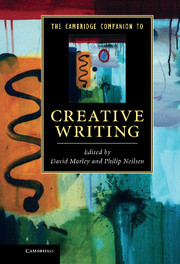Book contents
- Frontmatter
- 1 Introduction
- PART I GENRES AND TYPES
- PART II TOPICS
- 11 Serious play: creative writing and science
- 12 Outside the academy
- 13 Contemporary publishing
- 14 Imaginative crossings: trans-global and trans-cultural narratives
- 15 Does that make sense? Approaches to the creative writing workshop
- Further reading
- Other titles in this series
- Index
14 - Imaginative crossings: trans-global and trans-cultural narratives
from PART II - TOPICS
Published online by Cambridge University Press: 28 March 2012
- Frontmatter
- 1 Introduction
- PART I GENRES AND TYPES
- PART II TOPICS
- 11 Serious play: creative writing and science
- 12 Outside the academy
- 13 Contemporary publishing
- 14 Imaginative crossings: trans-global and trans-cultural narratives
- 15 Does that make sense? Approaches to the creative writing workshop
- Further reading
- Other titles in this series
- Index
Summary
When I was a young writer, writing teachers and books all said to ‘write what you know’. That is, your writing is best if it is ‘authentic’, if it reflects the people you have met and the places you have been. To that end, as an American writer, I have often been advised only to write about black characters. My instinct as a student was always to rail against such advice. I sought joyfully to write what I could imagine – about people I'd never met and places and times I'd never been.
Decades and many published novels later, some editors were still subtly advancing the workshop admonition – ‘write what you know’, by suggesting that I delete from my novel Douglass’ Women Ottilie Assing, a character based upon a nineteenth-century German woman with a Jewish and Christian heritage. The assertion was that as a woman of colour, I didn't ‘know’ such history, such people, and my readers – all black, of course! – could not have cared less about the white mistress of abolitionist, Frederick Douglass. The novel, Douglass' Women, ultimately (and gratefully) published by Atria Books, became an award-winning and critical success.
Of course, a writer should write about whomever and whatsoever they please, whether it be unknowable aliens, or ethnic and racial groups from far afield. If race, itself an artificial construct, prevents us from ‘knowing’ and writing about one another, then we are suggesting that people are not a common family. Equally dangerous is the notion that readers, too, only want to read what reflects their cultural reality. Letters from readers – within and without America’s borders – of diverse cultural and religious backgrounds, have long disabused me of this silly notion.
- Type
- Chapter
- Information
- The Cambridge Companion to Creative Writing , pp. 196 - 200Publisher: Cambridge University PressPrint publication year: 2012

